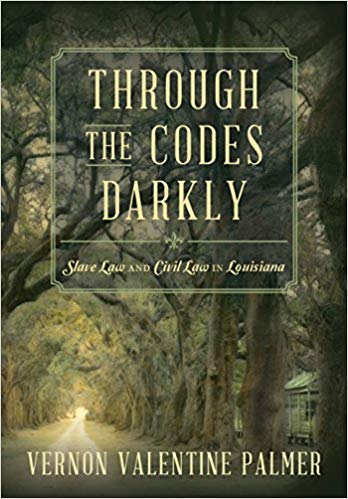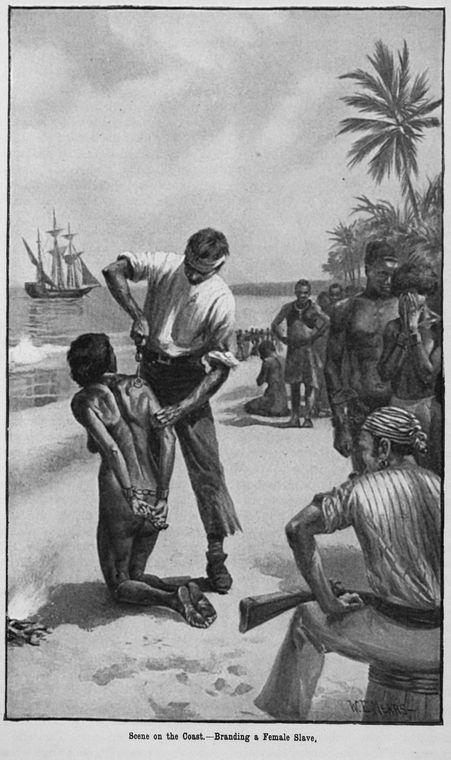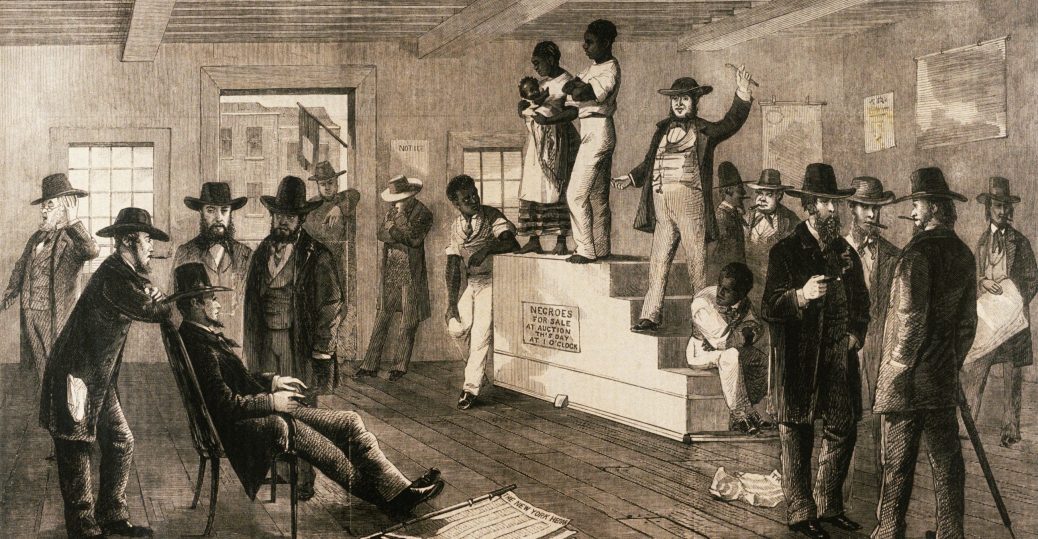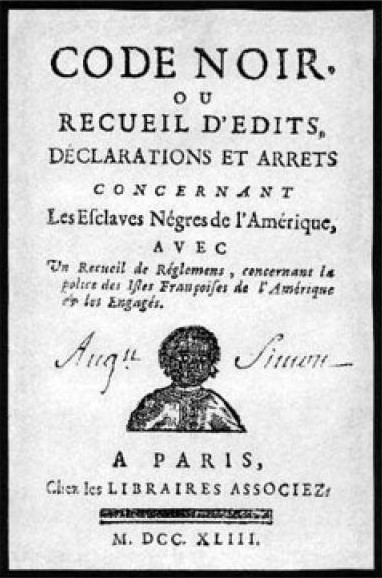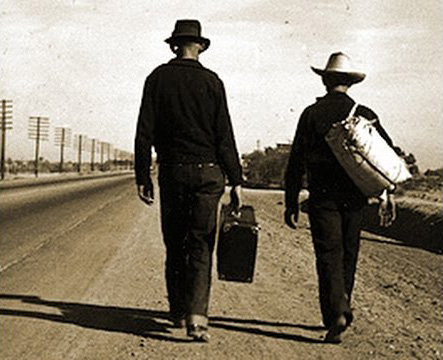So you’re a French politician who’s about to write “humanitarian” laws aimed at protecting slaves, where do you start? You begin by declaring that all enemies of Christianity, that is Jews and Protestants, should be expelled from the land. Get endorsement from the Catholic Church who will help protect the souls of slaves by baptizing all of them. Make Sundays work-free so they can learn about their faith. Clarify that although they are humans with souls worth saving, they are still not on par with their masters. Subhuman somehow. Prohibit the torture and mutilation of slaves but also allow the masters to apply some “humane” punishments like ear amputations, beatings by rods or straps, and branding! Punishment by death should be restricted to serious crimes only like stealing cattle. No trial is required.
Code Noir was in force for more than a century but rarely enforced, thanks to an ocean separating the French government from the colonies. French philosopher, Louis Sala-Molins, described it in 1987 as “the most monstrous legal document of modern times.” Read the entire body of laws here:
Edict of the King: 1Michael Burger, Sources for the History of Western Civilization, Volume I: From Antiquity to the Mid-Eighteenth Century (University of Toronto Press, 2015), 469. This reference book is the source for the translation provided unless specified below for particular articles.
On the subject of the Policy regarding the Island of French America
March 1685.
Recorded at the sovereign Council of Saint Domingue, 6 May 1687.
Louis, by the grace of God, King of France and Navarre: to all those here present and to those to come, GREETINGS. In that we must also care for all people that Divine Providence has put under our tutelage, we have agreed to have the reports of the officers we have sent to our American islands studied in our presence. These reports inform us of their need for our authority and our justice in order to maintain the discipline of the Roman, Catholic, and Apostolic Faith in the islands. Our authority is also required to settle issues dealing with the condition and quality of the slaves in said islands. We desire to settle these issues and inform them that, even though they reside infinitely far from our normal abode, we are always present for them, not only through the reach of our power but also by the promptness of our help toward their needs.
For these reasons, and on the advice of our council and of our certain knowledge, absolute power and royal authority, we have declared, ruled, and ordered, and declare, rule, and order, that the following pleases us:
First article:
We desire and we expect that the Edict of 23 April 1615 of the late King, our most honored lord and father who remains glorious in our memory, be executed in our islands. This accomplished, we enjoin all of our officers to chase from our islands all the Jews who have established residence there. As with all declared enemies of Christianity, we command them to be gone within three months of the day of issuance of the present [order], at the risk of confiscation of their persons and their goods.
Article 2:
All slaves that shall be in our islands shall be baptized and instructed in the Roman, Catholic, and Apostolic Faith. We enjoin the inhabitants who shall purchase newly-arrived Negroes to inform the Governor and Intendant of said islands of this fact within no more that eight days, or risk being fined an arbitrary amount. They shall give the necessary orders to have them instructed and baptized within a suitable amount of time.
Article 3:
We forbid any religion other than the Roman, Catholic, and Apostolic Faith from being practiced in public. We desire that offenders be punished as rebels disobedient of our orders. We forbid any gathering to that end, which we declare to be conventicle, illegal, and seditious, and subject to the same punishment as would be applicable to the masters who permit it or accept it from their slaves.
Article 4:
Article 5:
We forbid our subjects who belong to the so-called “reformed” religion [Protestants] from causing any trouble or unforeseen difficulties for our other subjects or even for their own slaves in the free exercise of the Roman, Catholic, and Apostolic Faith, at the risk of exemplary punishment.
Article 6:
We enjoin all our subjects, of whatever religion and social status they may be, to observe Sundays and the holidays that are observed by our subjects of the Roman, Catholic, and Apostolic Faith. We forbid them to work, nor make their slaves work, on said days, from midnight until the following midnight. They shall neither cultivate the earth, manufacture sugar, nor perform any other work, at the risk of a fine and an arbitrary punishment against the masters, and of confiscation by our officers of as much sugar worked by said slaves before being caught.
Article 7:
We forbid them also to hold slave markets or any other market on said days at the risk of similar punishments and of confiscation of the merchandise that shall be discovered at the market, and an arbitrary fine against the sellers.
Article 8:
Article 9:
The free men who will have one or several children from their concubinage with their slaves, together with the masters who permitted this, will each be condemned to a fine of two thousand pounds of sugar ; and if they are the masters of the slave by whom they have had the said children, we wish that beyond the fine, they be deprived of the slave and the children, and that she and they be confiscated for the profit of the [royal] hospital, without ever being manumitted [released from slavery]. Nevertheless we do not intend for the present article to be enforced if the man who was not married to an other person during his concubinage with his slave would marry in the church the said slave who by this means will be manumitted and the children rendered free and legitimate. 2Article 9 translation by John Garrigus
Article 10:
Solemnities for marriage prescribed by the edict of Blois and the declaration of November 1639 will be observed for free people as well as for slaves. Nevertheless, father’s and mother’s [the slave’s parents] consent will not be necessary, but only the master’s consent.
Article 11:
We forbid priests from conducting weddings between slaves if it appears that they do not have their masters’ permission. We also forbid masters from using any constraints on their slaves to marry them without their wishes [slaves have to consent too].
Article 12:
Article 13:
We desire that if a male slave has married a free woman, their children, either male or female, shall be free as is their mother, regardless of their father’s condition of slavery. And if the father is free and the mother a slave, the children shall also be slaves.
Article 14:
Masters are held to put into Holy Ground in cemeteries so designated [as will] their baptized slaves; and those who die without having received baptism will be buried at night in some field near the place where they died.
Article 15:
We forbid slaves from carrying any offensive weapons or large sticks, at the risk of being whipped and having the weapons confiscated. The weapons shall then belong to he who confiscated them. The sole exception shall be made for those who have been sent by their masters to hunt and who are carrying either a letter from their masters or his known mark.
Article 16:
In the same way we forbid slaves belonging to different masters to gather in the day or night whether claiming for wedding or otherwise, whether on their master’s property or elsewhere, and still less in the main roads or faraway places, on pain of corporal punishment, which will not be less than the whip and the fleur de lys [branding with the symbol of the kings of France; this was a punishment for deserters and habitual criminals in France] and which in cases of frequent violations and other aggravating circumstances can be punished with death: this we leave to the decision of judges. We charge all our subjects to approach the offenders, to arrest them and take them to prison, even if they are not officers and there is not yet any decree against them.3Article 16 translation by John Garrigus
Article 17:
Masters who are convicted of having permitted or tolerated such assemblies composed of slaves other than those belonging to them will be condemned in their own and private name to pay for all the damage that will have been done to their neighbors by these said assemblies and a fine of 10 ecus for the first time and double for repeat offenses.
Article 18:
We forbid slaves to sell sugar cane for whatever reason or occasion, even with the permission of their master, on pain of whipping for the slaves and 10 livres tournois for their masters who permitted it, and a similar fine against the buyer. [Translator’s note: In this period a slave might cost about 1,000 livres and a fine horse, about 400. A day laborer in France might earn 1/2 to 1 livre per day.]4Article 18 translation by John Garrigus
Article 19:
We also forbid slaves from selling any type of commodities, even fruit, vegetables, firewood, herbs for cooking and animals either at the market, or at individual houses, without a letter or a known mark from their masters granting express permission. Slaves shall risk the confiscation of goods sold in this way, without their masters receiving restitution for the loss, and a fine of six pounds shall be levied against the buyers. . . .
Article 20:
We wish, to this end, that two persons be charged by our officers in each market to examine the commodities and merchandises that will be carried by the slaves, together with the tickets and marks of their masters.
Article 21:
We permit to all our subjects living in our islands to take all the things slaves are carrying when these slaves are without tickets from their masters, or known marks, to be returned instantly to their masters, if the plantations are neighboring the place were the slaves are surprised in this crime, if not they will be instantly sent to the hospital to be held there until the masters have been notified.
Article 22:
Article 23:
We forbid them to give to the slaves cane brandy in place of the subsistence mentioned in the previous article.
Article 24:
We similarly forbid them to unburden themselves of the food and subsistence of their slaves by permitting them to work a certain day of the week for own ends.
Article 25:
Each year masters will have to furnish each slave with two outfits of canvas or 4 aulnes [about one square yard or meter] of canvas, at the master’s discretion.
Article 26:
Slaves who will not be fed, dressed and supported by their masters will be able to tell it to our general public prosecutor, and to give him a report. If he receives several such reports, he will bring proceedings against these masters, what we want to be observed for crimes and barbaric and inhuman treatments of masters on their slaves.Article 27:
Slaves who are infirm due to age, sickness or other reason, whether the sickness is curable or not, shall be nourished and cared for by their masters. In the case that they be abandoned, said slaves shall be awarded to the hospital, to which their master shall be required to pay six sols per day for the care and feeding of each slave.
Article 28:
Article 29:
Nevertheless, we want masters to be responsible for what they have ordered to their slaves, for what they have managed and negotiated in shops, and for the particular kind of trade slaves were put in charge of. If masters have given no orders, they will be responsible for what they earned. If masters have earned nothing, the money they let their slaves have will be let to these slaves, after the deduction of the amount due to the master. Otherwise, if the money consist in merchandises that slaves can trade for their own count, masters will only deduct a tax relative to the propriety of the land.
Article 30:
Slaves will not be able to take part in offices or commissions of the public service, neither to be named agent by anybody except their master to manage or administrate any trade, nor to become referees, experts or witnesses in civil or criminal trials. If they are called to testify, their evidence will only be used as a statement of case to help judges to clarify the case, and it will not be used for a presumption, a conjecture, or an evidence.
Article 31:
Slaves shall not be a party, either in court or in a civil matter, either as a litigant or as a defendant, or as a civil party in a criminal matter. And compensation shall be pursued in criminal matters for insults and excesses that have been committed against slaves.
Article 32:
Anybody will be able to bring criminal proceedings against slaves without the responsibility of their master, except in case of complicity. These slaves will be judged by ordinary judges in a country court, and on appeal in the Supreme Council, with the same formalities as for free people.
Article 33:
Article 34:
We also want abuses and violent acts of slaves against free people to be hardly punished, even by death penalty.
Article 35:
Article 36:
Article 37:
If robberies or other damages are caused by their slaves, masters will have to repair these damages in their own name, in addition to the slaves corporal punishment. Instead of paying the fine, masters are allowed to give these slaves to the person who suffered the damages, what they have to choose in the three days following the condemnation. Otherwise, they will have to pay the fine.
Article 38:
Article 39:
Article 40:
The slave who has been punished with death based on denunciation by his master, and who is not a party to the crime for which he was condemned, shall be assessed prior to his execution by two of the principal citizens of the island named by a judge. The assessment price shall be paid by the master, and in order to satisfy this requirement, the Intendant shall impose said sum on the head of each Negro. The amount levied in the estimation shall be paid for each of the said Negroes and levied by the [Tax] Farmer of the Royal Western lands to avoid costs.
Article 41:
We forbid judges, public prospectors and clerks of the Court to tax any slave in a criminal trial. Failing this, they will be judged for misappropriation of public funds.
Article 42:
Article 43:
We enjoin our officers to criminally prosecute the masters, or their foremen, who have killed a slave under their auspices or control, and to punish the master according to the circumstances of the atrocity. In the case where there is absolution, we allow our officers to return the absolved master or foreman, without them needing our pardon [masters who kills their slaves should be punished—punishment no specified].
Article 44:
We declare slaves to be charges, and as such enter into community property. They are not to be mortgaged, and shall be shared equally between the co-inheritors without benefit to the wife or one particular inheritor, nor subject to the right of primogeniture, the usual customs duties, feudal or lineage charges, or feudal or seigneurial taxes. They shall not be affected by the details of decrees, nor from the imposition of the four-fifths, in case of disposal by death or bequeathing.
Article 45:
But we do not want to deprive our subjects of the faculty to stipulate these rights which belong to them and their family, as is the usual practice for money and other movables.
Article 46:
For slave seizures, the formalities of our edicts and the customs for movables’ seizures will be applied. We want the money coming from these seizures to be distributed in the seizure order. In case of a financial collapse, we want the privileged debts to be paid first, and the situation of slaves and other movables to be settled, except for the following cases.
Article 47:
Husband, wife and prepubescent children, if they are all under the same master, may not be taken and sold separately. We declare the seizing and sales that shall be done as such to be void. For slaves who have been separated, we desire that the seller shall risk their loss, and that the slaves he kept shall be awarded to the buyer, without him having to pay any supplement.
Article 48:
Moreover, slaves who are working at the moment in sugar factories, indigo-plant factories, or private houses, aged between fourteen and sixty, cannot be seized for debt, except if they are not totally purchased, or if the sugar factory, or indigo-plant factory, or private house where they are working is really seized. We forbid purchasers to buy sugar factories, indigo-plant factories, or private houses by seizure or auctioning without including slaves who work in and who are aged between 14 and 60. failing this, the purchase will be declared null and void.
Article 49:
Judiciary farmers who will seize sugar factories, indigo-plant factories or private houses, including slaves who work in will have to pay the whole price of their lease. Slave children who will be born during this lease will not become the propriety of these farmers.
Article 50:
We declare, and any contrary convention will be declared null and void, that every slave children will belong to the seized part if the creditors are satisfied, and to purchasers if a decree intervenes. To that end, in the last public notice before the establishment of the decree, we will mention slave children born since the seizure. In the same notice, we will mention slaves who died since the seizure, when they were still alive.
Article 51:
In order to avoid extra expenses and long proceedings, we want the whole amount of the sale by auction to be distributed between creditors, according to their privileges and mortgage order, with no distinction between the price of funds and the price of slaves.
Article 52:
Nevertheless, feudal and Lords rights will only be paid in proportion of the price of funds.
Article 53:
People of noble lineage and feudal Lords will be allowed to withdraw these funds only when the slaves sold together with these funds will have been withdrawn. In the same way, purchasers will not be able to take the slaves if funds are not left.
Article 54:
Bourgeois and noble guards, people who obtained the management of the factories where slaves work, will have to lead these slaves as good family fathers. They will not be responsible and they will not have to pay for slaves who died, who were undermined by illness, old age or other reasons without their fault. Slave children who will be born during their management will not belong to them but to their former masters and owners.
Article 55 :
Article 56:
The children who are declared to be sole legatees [those to whom a legacy is bequeathed] by their masters, or named as executors of their wills, or tutors of their children, shall be held and considered as freed slaves.
Article 57:
We consider that slaves who were emancipated in our islands are born in our islands, and that they do not need our naturalizing letters to be in full possession of our natural subjects’ advantages in our kingdom, lands and countries under our obedience, even if they are born in foreign countries [freed slaves are French subjects, regardless of their place of birth].
Article 58:
We declare their freedom is granted in our islands if their place of birth was in our islands. We declare also that freed slaves shall not require our letters of naturalization to enjoy the advantages of our natural subjects in our kingdom, lands or country of obedience, even when they are born in foreign countries [freed slaves have the same right as other French subjects].
Article 59:
We grant to freed slaves the same rights, privileges and immunities that are enjoyed by freeborn persons. We desire that they are deserving of this acquired freedom, and that this freedom gives them, as much for their person as for their property, the same happiness that natural liberty has on our other subjects.
Article 60:
We declare that every confiscation and fine belong to us and that it must be paid or given to people who are in charge of our salaries benefits in the islands. Nonetheless, we want a third part of these confiscations and fines to be paid to the hospice of the island where it took place.
Note: Also read French version of Code Noir here.
You might also like:
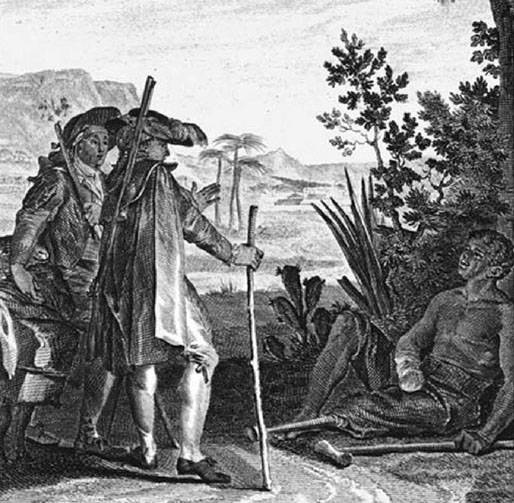
Voltaire’s radical views on race and slavery
Understanding Voltaire’s view on race and slavery through the eyes of Candide
BOOK: CANDIDE
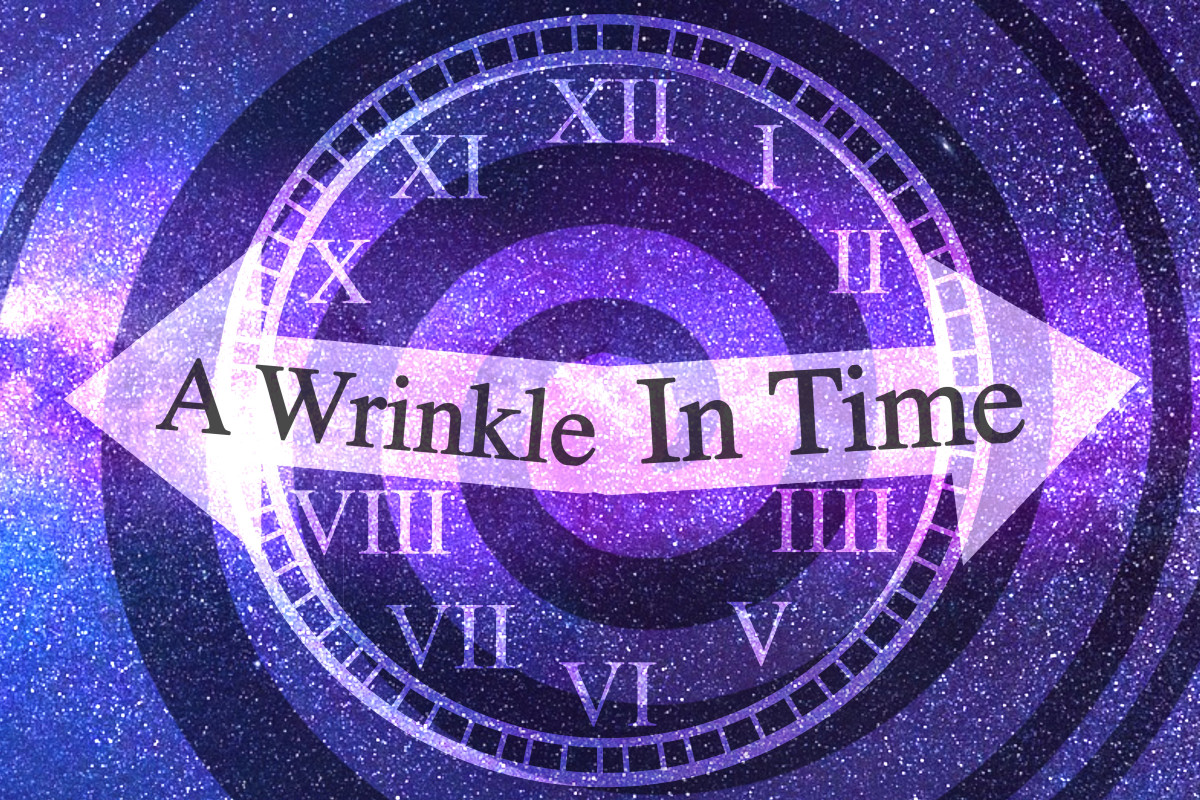
A Wrinkle in Time: Is it blasphemous or too Christian?
Two reasons Madeleine L’Engle’s book was challenged by religious conservatives
BOOK: A WRINKLE IN TIME
Endnotes

